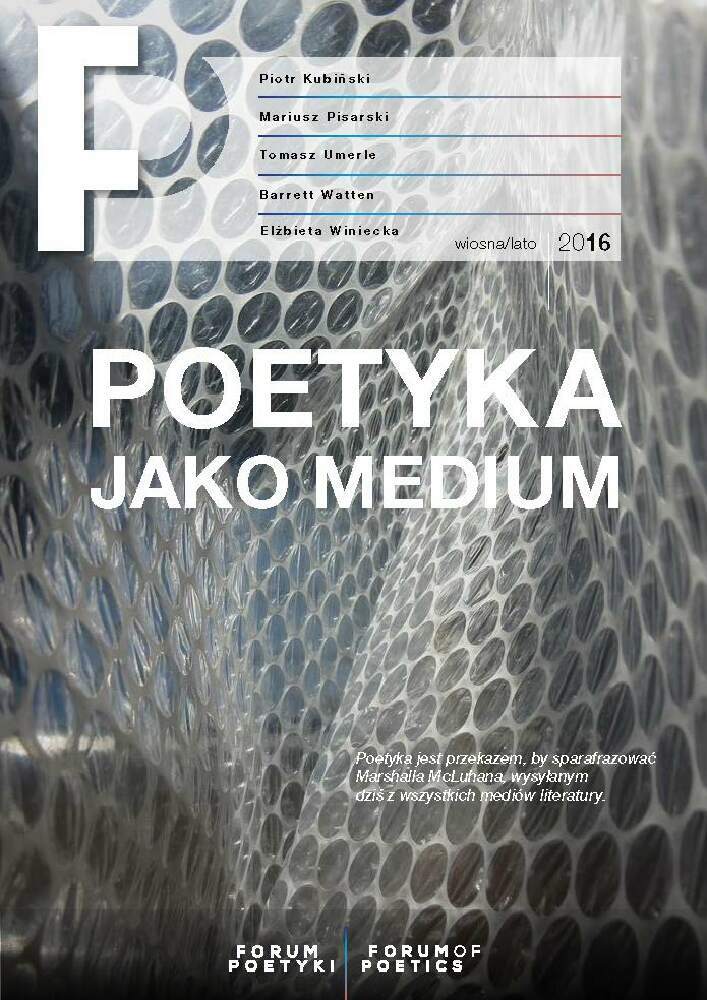Abstract
The article shows how video games fit into the spectrum of poetic inquiry and tackles the question of how the tools of traditional poetological studies can be expanded in the context of digital texts. The author considers the interpretative potential that can be discovered in video games. He also points to the specific problems involved in manifesting metaphorical discourse in games without recourse to the medium of language.
References
Balcerzan, Edward. „«Narodowość» poetyki – dylematy typologiczne”. Forum Poetyki, nr 2 (2015).
Battey, Tom. „Narrative Design in Dark Souls”. Gamasutra, 2014. https://www.gamasutra.com/blogs/TomBattey/20140425/216262/Narrative_Design_in_Dark_Souls.php.
Bogost, Ian. Persuasive Games: The Expressive Power of Videogames. Cambridge, MA - London, 2010.
Calleja, Gordon. In-Game: From Immersion to Incorporation. Cambridge - London, 2011.
Dachlen, Ch. „What Dark Souls Is Really All About”. Kotaku, 2012. https://kotaku.com/what-dark-souls-is-really-all-about-5874599.
Dark Souls. From Software, 2011.
Douglas, Alexander. 1Noughts and Crosses, 1952.
Dudziński, R. , i Piotr Kubiński, red. „Dystans ironiczny w grach «Wiedźmin»”. W Wiedźmin – bohater masowej wyobraźni. Wrocław, 2015.
Dudziński, R. „«Wiedźmin 2: Zabójcy królów»”. W Wiedźmin – bohater masowej wyobraźni. Wrocław, 2015.
Flower. Thatgamecompany, 2009.
Głowiński, Michał. „Poetyka wobec tekstów nieliterackich”. W Poetyka i okolice. Warszawa, 1992.
Kubiński, Piotr. „Bergman vs. Batman: chwyt technicznej deziluzji w grach wideo na tle praktyk literackich i filmowych”. Images. The International Journal of European Film, Performing Arts and Audiovisual Communication, nr 1 (2015): 113–23.
Kubiński, Piotr. „Co wyczytasz pod skórą Wiedźmina 3?” Ha!art, nr 3 (2015).
Kubiński, Piotr. „Emersja: antyiluzyjny wymiar gier wideo”. Nowe Media, nr 1(5) (2014): 161–76.
Kubiński, Piotr. Gry wideo – zarys poetyki. Kraków, 2006.
Kubiński, Piotr. „Gry wideo w świetle narratologii transmedialnej oraz koncepcji światoopowieści (storyworld)”. Tekstualia : palimpsesty literackie, artystyczne, naukowe. 2015, nr 4 (2015): 23–36.
Kuziak, Michał. „Komparatystyka na rozdrożu?” Porównania, nr 4 (2007): 11–20.
Mizerkiewicz, Tomasz. „Nowe sytuacje poetyki”. Forum Poetyki, nr 1 (2015).
Nycz, Ryszard. Poetyka doświadczenia: teoria - nowoczesność - literatura. Kraków, 2012.
Nycz, Ryszard. Tekstowy świat: poststrukturalizm a wiedza o literaturze. Kraków, 2000.
Rettberg, Scott. „Budowanie wspólnoty wokół literatury elektronicznej”. Teksty Drugie 2015, nr 3 (2015): 135–55.
Rewers, Ewa. „Interpretacja jako lustro, różnica i rama”. W Filozofia i etyka interpretacji, zredagowane przez Adam F Kola i Andrzej Szahaj. Kraków: Universitas, 2007.
Ryan, M. L. „Immersion vs. Interactivity: Virtual Reality and Literary Theory”. Postmodern Culture, nr 1 (1994). http://muse.jhu.edu/content/oai/journals/substance/v028/28.2ryan.html.
Szczęsna, Ewa. Poetyka mediów: polisemiotyczność, digitalizacja, reklama. Warszawa, 2007.
Szczęsna, Ewa. Poetyka reklamy. Warszawa, 2001.
Wes, Cherry. Microsoft Solitaire. Microsoft Corporation Inc., 1990.
Wiedźmin. CD Projekt RED, 2007
License
Authors of articles are responsible for securing the rights to other publications (texts, tables, drawings and other illustrations) quoted or reproduced in their texts.

